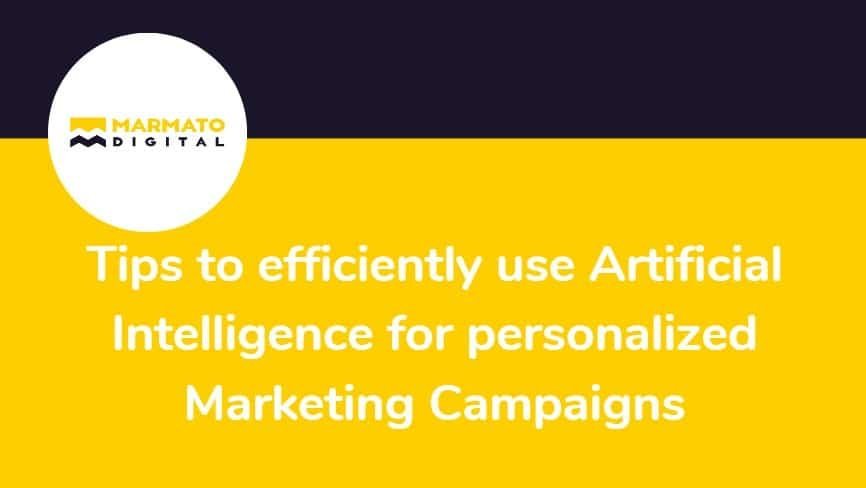In today’s digital age, personalized marketing is a crucial strategy for businesses aiming to stand out and connect with their target audiences. The key to success lies in tailoring marketing efforts to individual preferences and needs, and this is where Artificial Intelligence (AI) steps into the spotlight.

Artificial Intelligence, with its remarkable capabilities, empowers businesses to understand their customers and craft personalized marketing campaigns and brand experiences that resonate with everyone.
In this article, we will delve into the realm of AI-driven marketing personalization for a great brand experience. In addition, let’s explore how businesses can harness the power of AI to efficiently create and implement personalized marketing campaigns that drive engagement, conversions, and customer loyalty.
Leveraging Artificial Intelligence for audience understanding:
Artificial Intelligence (AI) driven tools and techniques have revolutionized how businesses perceive and interact with their audience. Moreover, AI’s role in audience understanding is rooted in its ability to process and analyze vast amounts of data with remarkable precision. By harnessing AI, businesses can delve into the intricacies of customer data, behaviors, and preferences like never before.
One of the most powerful applications of AI in audience understanding is its capacity to analyze customer behaviors across various touchpoints. For instance, AI-powered tools can track user interactions on websites, mobile apps, and social media platforms. Moreover, they can decipher browsing histories, click-through rates, and purchase histories to build a holistic view of each customer’s digital journey. Additionally, this knowledge allows businesses to tailor their marketing efforts based on the actions and preferences of individual customers.
Furthermore, AI offers a range of sophisticated tools and techniques for audience profiling. For instance, natural language processing (NLP) algorithms can analyze customer reviews, social media posts, and customer service interactions to gauge sentiment and opinions. In addition, this sentiment analysis provides valuable insights into customer attitudes and preferences. Likewise, machine learning models can segment audiences into distinct groups based on shared characteristics, making it easier to create personalized marketing campaigns.
Artificial Intelligence-driven Personalization Techniques:
Artificial Intelligence (AI) has opened a treasure trove of personalization techniques that can transform how businesses engage with customers. Let’s explore AI-driven personalization techniques, such as recommendation engines, content customization, and email personalization. Also, each technique delivers tailored and relevant brand experiences to customers.
• Recommendation Engines:
Recommendation engines are the bedrock of personalized experiences in the digital world. They analyze a customer’s past behaviors, such as product views and purchases, to suggest products that align with their interests.
For instance, think about how Amazon suggests products related to your previous purchases. Moreover, this enhances cross-selling and upselling opportunities. In addition, it also keeps customers engaged and returning for more. In addition, the beauty of recommendation engines lies in their ability to continuously learn and refine their suggestions, improving accuracy over time.
• Content Customization:
Content customization involves tailoring the content a customer sees based on their preferences, location, and browsing history. AI analyzes user’s behavior to serve them the most relevant articles, videos, or product listings. Moreover, this increases engagement and provides a more seamless and enjoyable browsing experience.
For example, a news website might show different stories to users interested in politics than those interested in sports.
• Email Personalization:
Email remains a potent marketing tool, and artificial intelligence has revolutionized how businesses use it. Email personalization goes beyond addressing the recipient by name; it involves crafting email content that resonates with everyone’s interests and behaviors. Besides, AI can segment email lists, create dynamic content blocks, and send emails at optimal times. As a result, recipients receive personalized emails, leading to higher open rates, click-through rates, and conversions.
The benefits of these AI-driven personalization techniques are manifold.
- Firstly, they enhance the customer experience by presenting content and products of their interest. This results in increased customer satisfaction and loyalty.
- Secondly, businesses enjoy improved conversion rates, as personalized recommendations are more likely to result in purchases.
- Lastly, AI-driven personalization can lead to better data collection, allowing businesses to refine their strategies and better understand their customers.
Impact of Artificial Intelligence on Customer Experience:
Transforming Customer Experiences through Personalization:
You cannot overstate Artificial Intelligence’s impact on customer experience. By harnessing the power of AI, businesses have moved away from generic, one-size-fits-all approaches toward highly personalized interactions. AI has made customers feel valued by providing personalized product recommendations and marketing messages.
Real-World Success Stories:
Let’s explore some real-world examples of how AI-driven personalization has had a profound impact on customer satisfaction:
- Netflix:
Netflix’s recommendation system, powered by AI algorithms, suggests movies and TV shows tailored to each viewer’s taste. This level of personalization has significantly contributed to their success, with over 80% of content watched coming from recommendations.
- Spotify:
Spotify uses artificial intelligence to curate personalized playlists and recommend music based on a user’s listening history. This has led to increased user engagement and longer listening sessions.
- Amazon:
Amazon’s product recommendation engine, fueled by AI, accounts for 35% of its total sales. It analyzes past purchases and browsing history to suggest products that customers are likely to buy.
- Starbucks:
Starbucks employs AI in its mobile app to offer personalized rewards and suggest drinks based on individual preferences. This has led to a substantial increase in app usage and customer loyalty.
In the above cases, AI has improved the customer experience and boosted business revenue and customer loyalty. These real-world success stories demonstrate how AI-driven personalization can have a transformative impact on customer satisfaction and engagement.
Practical Steps for implementing AI-Powered Personalization:
Implementing artificial intelligence (AI) for personalized marketing campaigns can seem like a daunting task, but with the right approach and guidance, businesses can unlock their full potential.
Step 1: Define Your Objectives
Define what you want to achieve with artificial intelligence, whether it’s improving customer engagement, increasing conversions, or enhancing customer loyalty.
Step 2: Identify the Right AI Tools or Platforms
Selecting the right AI tools or platforms is crucial. Consider your budget and the complexity of your requirements. Popular AI platforms like Google AI and IBM Watson or cloud-based services like Amazon SageMaker offer a range of AI capabilities.
Step 3: Collect and Manage Data Effectively
Collect relevant data from various touchpoints, such as websites, mobile apps, and social media. Ensure data quality and privacy compliance, as clean and well-managed data is essential for accurate AI insights.
Step 4: Implement Machine Learning Models
Utilize machine learning models to analyze customer data and generate insights. These models can help segment your audience, predict customer behavior, and provide recommendations. Collaborate with data scientists or AI specialists to build and fine-tune these models.
Step 5: Integrate Artificial Intelligence into Existing Marketing Workflows
Integrating AI into your existing marketing workflows is key to seamless implementation. Ensure that AI-generated insights and recommendations flow seamlessly into your marketing campaigns, whether it’s email marketing, content personalization, or product recommendations.
Step 6: Test and Refine
AI implementation is an iterative process. Continuously test and refine your AI-driven marketing campaigns. A/B testing, customer feedback, and performance analytics are invaluable in optimizing your AI-powered personalization efforts.
Step 7: Monitor and Measure Results
Regularly monitor the performance of your AI-powered campaigns. Use key performance indicators (KPIs) like click-through rates, conversion rates, and customer retention to assess the impact of AI on your marketing strategy.
Step 8: Adapt and Scale
As you gather more data and insights, adapt your AI strategies accordingly. Scale your AI efforts to encompass new channels and touchpoints, ensuring personalized brand experiences reach customers wherever they engage with your brand.
Overcoming Challenges and Ethical Considerations:
Implementing artificial intelligence for personalization can be incredibly beneficial. Businesses often encounter several challenges on their journey toward harnessing their power.
Common Challenges:
- Data Quality and Quantity:
One of the foremost challenges is ensuring that you have enough high-quality data to train AI models effectively. Incomplete data can lead to inaccurate personalization recommendations.
- Integration Complexity:
Incorporating AI into established systems and workflows can be complex and time-intensive. Compatibility issues and resistance to change within the organization can pose significant challenges.
- Cost and Resources:
AI implementation requires investment in technology, expertise, and infrastructure. Allocating the essential resources might pose a challenge for small businesses.
- Algorithm Bias:
AI models can inadvertently perpetuate bias present in historical data. This may result in unfair consequences, raising significant ethical issues.
Importance of Ethical AI Practices:
Ethical considerations are paramount in AI-driven personalization.
- Data Privacy:
Customers entrust businesses with their data, and it’s crucial to respect their privacy. Implement robust data protection measures and comply with relevant data privacy regulations, such as GDPR or CCPA. Transparently inform customers about data collection and usage practices.
- Transparency:
Businesses should be transparent about their use of AI for personalization. Customers have the right to know when AI is making recommendations or decisions that affect them. Explain how AI is used and provide options for customers to opt-out or adjust their preferences.
- Fairness and Bias Mitigation:
Proactively strive to detect and address bias within AI algorithms. Regularly audit AI models to ensure they provide fair and equitable recommendations to all customers, regardless of demographics.
- Accountability:
Establish clear lines of responsibility for AI systems. Ensure that someone within the organization is accountable for AI ethics and compliance.
Conclusion:
In conclusion, Artificial Intelligence has revolutionized the way businesses understand their target audience. The key takeaways are clear: AI offers businesses the tools to deeply understand their audience, employ effective personalization techniques, and significantly enhance the customer experience. Its role in modern marketing is not just significant; it’s indispensable. Therefore, we encourage businesses to embrace AI as a strategic ally, enabling them to engage customers more effectively, boost conversions, and foster enduring relationships. By harnessing the capabilities of AI, businesses can stay ahead in the competitive landscape and deliver the tailored experiences that today’s customers demand and appreciate.
Unlock the full potential of AI for your marketing campaigns!
Start your journey towards creating more personalized and efficient customer experiences today. Whether you’re a small business looking to boost engagement or an enterprise striving for unparalleled customer satisfaction, embracing AI is the key to success.
Contact Us to explore AI-driven solutions tailored to your specific needs, and let Artificial Intelligence be your partner in delivering extraordinary personalized marketing campaigns.
Subscribe to blogs
Get our latest blogs directly to your inbox.

